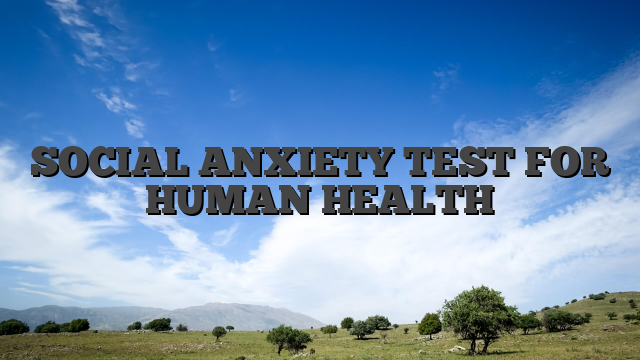Introduction
In a world where social interactions are a fundamental part of everyday life, the prevalence of social anxiety cannot be underestimated. For countless individuals, the mere thought of engaging in social situations can trigger an overwhelming sense of fear and discomfort. This intricate emotional web, known as social anxiety, can hinder personal growth, limit opportunities, and lead to feelings of isolation. However, in the journey towards understanding and conquering this formidable challenge, the social anxiety test emerges as an invaluable tool. In this comprehensive guide, we will explore the realm of social anxiety, the significance of self-assessment, the dynamics of the social anxiety test, and how this instrument can be a guiding beacon towards liberation and self-empowerment.
1. Demystifying Social Anxiety: A Deeper Insight
Social anxiety, often referred to as social phobia, is more than just being shy or introverted. It is an intricate mental health condition characterized by an intense fear of judgment, humiliation, or embarrassment in social situations. This fear can lead to avoidance behavior, where individuals actively steer clear of situations that trigger anxiety. It can manifest in diverse scenarios such as public speaking, attending parties, or even making eye contact with strangers. By unraveling the layers of social anxiety, individuals can gain a clearer understanding of their emotions and responses, paving the way for growth and recovery.
2. The Subtle Indicators: Recognizing Symptoms of Social Anxiety
Identifying the signs of social anxiety is paramount for both self-awareness and seeking support. Physical symptoms like trembling, rapid heartbeat, and sweating often accompany the psychological distress. Cognitive indicators include excessive worry about upcoming social events, fear of judgment, and self-consciousness. The emotional toll of social anxiety can lead to chronic stress, low self-esteem, and depression. By recognizing these signs, individuals can begin to acknowledge their struggles and initiate a journey towards healing.
3. Embracing Self-Assessment: The Role of a Social Anxiety Test
A social anxiety test is a self-assessment tool designed to assist individuals in evaluating the extent of their social anxiety symptoms. While it cannot replace a professional diagnosis, it offers valuable insights into one’s emotional landscape. These tests typically consist of a series of questions that delve into social scenarios, emotional responses, and behavioral tendencies. By answering these questions honestly, individuals can gain a deeper understanding of their thought patterns, triggers, and areas that require attention.
4. Navigating the Test: What to Expect
Embarking on a social anxiety test can be a transformative experience, opening doors to self-discovery and personal growth. The questions posed in these tests encompass a range of situations, from social gatherings to one-on-one interactions. They may inquire about emotional responses, levels of discomfort, and the prevalence of avoidance behaviors. Honesty is crucial for accurate results, as they serve as a springboard for seeking further guidance.
5. Decoding the Results: Interpreting Social Anxiety Test Outcomes
Upon completing a social anxiety test, individuals are presented with results that indicate the severity of their symptoms. These results should be interpreted with care and perhaps in consultation with mental health professionals. Mild to moderate scores may suggest manageable levels of social anxiety, while higher scores could signal the need for more comprehensive support. It’s important to note that a single test is not a definitive diagnosis, but rather a stepping stone toward self-awareness and proactive change.
6. Embracing Growth: Seeking Professional Support
While a social anxiety test offers valuable insights, professional assistance is essential for comprehensive understanding and healing. Mental health experts, including psychologists and therapists, can offer personalized guidance, evidence-based therapies, and coping strategies tailored to individual needs. Through therapy, individuals can work on challenging negative thought patterns, developing effective communication skills, and gradually confronting their fears.
7. The Empowered Journey: Breaking Free from Social Anxiety
Embracing the knowledge gained from a social anxiety test can be a catalyst for transformation. Armed with self-awareness and professional support, individuals can embark on an empowering journey towards conquering social anxiety. The process involves confronting fears, building self-confidence, and adopting healthier ways of thinking and behaving in social situations. This journey is a testament to resilience and the human capacity for growth and change.
8. Empowering Coping Strategies: From Test to Transformation
As individuals gather insights from their social anxiety test, the journey towards self-empowerment gains momentum. Alongside professional guidance, adopting coping strategies can significantly enhance the process of managing social anxiety. These strategies can include mindfulness practices, deep breathing exercises, and progressive exposure techniques. By gradually facing feared situations in a controlled manner, individuals can build resilience and diminish the grip of social anxiety.
9. Nurturing Self-Compgressassion: A Pillar of Pro
Amidst the quest for change, cultivating self-compassion is a vital aspect often overlooked. Individuals grappling with social anxiety tend to be self-critical and perfectionistic, fueling the cycle of distress. Embracing self-compassion involves treating oneself with kindness and understanding, much like one would extend to a close friend facing similar challenges. By practicing self-compassion, individuals can counteract negative self-talk and foster a more nurturing internal dialogue.
10. Stepping Beyond Comfort Zones: Embracing Growth
Progress in overcoming social anxiety hinges on gradual exposure to feared situations. While this process can be daunting, it is a crucial step towards reclaiming control and building resilience. Setting achievable goals and consistently pushing the boundaries of comfort zones can lead to increased self-confidence and a sense of accomplishment. Celebrating even small victories is essential for sustaining motivation and momentum on the journey towards change.
11. The Role of Support Systems: Strengthening Connections
Social anxiety can lead to isolation, reinforcing the cycle of distress. Strengthening connections with supportive friends, family, or support groups can alleviate feelings of loneliness and provide a safe space for practicing social skills. These connections can also serve as a source of encouragement and validation, reinforcing the understanding that one is not alone in their struggles.
12. Mindfulness and Acceptance: Embracing the Present Moment
Practicing mindfulness involves being fully present in the moment, without judgment or attachment to past experiences or future outcomes. Mindfulness techniques, such as meditation and grounding exercises, can help individuals manage anxiety by redirecting attention away from distressing thoughts. Acceptance of present emotions and experiences, rather than fighting or resisting them, allows individuals to navigate social situations with a greater sense of calm and clarity.
13. Fostering Resilience: A Journey of Transformation
As individuals weave these strategies into their lives, a remarkable transformation unfolds. The journey from social anxiety to empowerment is marked by resilience—a capacity to face challenges, learn from setbacks, and continue moving forward. Through self-awareness, professional guidance, and a dedication to personal growth, individuals can rewrite their narratives and emerge stronger, more confident, and authentically connected to themselves and others.
14. Beyond Social Anxiety: Embracing a Brighter Future
The culmination of the social anxiety journey is a future unburdened by the weight of fear and avoidance. It is a future defined by meaningful relationships, professional accomplishments, and a profound sense of self-worth. By embarking on the path of self-discovery, utilizing the insights from a social anxiety test, and embracing the guidance of mental health professionals, individuals can break free from the constraints of social anxiety and open themselves to a world of endless possibilities.
Conclusion: A New Chapter of Empowerment
The social anxiety test isn’t merely a test; it’s a starting point for transformation. It illuminates the path towards self-awareness, providing individuals with a compass to navigate the complexities of their emotions and experiences. Armed with knowledge, resilience, and a toolkit of coping strategies, individuals can confidently step into the arena of social interactions. The journey towards conquering social anxiety is a testament to human potential—a journey of self-empowerment, growth, and the realization that the power to shape one’s narrative lies within. As you step into this new chapter, remember that you are not defined by your fears, but rather by your capacity to rise above them.




